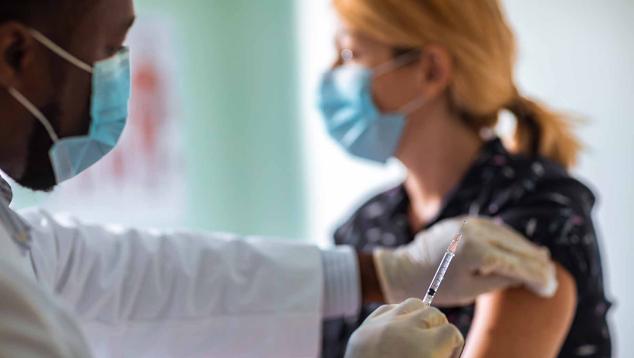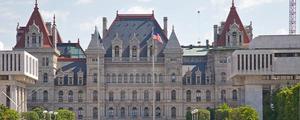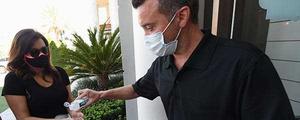Story Highlights
- Those in U.S. willing to get an FDA-backed COVID-19 vaccine falls to 50%
- Willingness down among Democrats and independents, up among Republicans
- New high of 26% waiting for a vaccine before getting back to normal
WASHINGTON, D.C. -- Americans' willingness to be vaccinated against the coronavirus has dropped 11 percentage points, falling to 50% in late September. This sharp decline comes after the percentage dwindled from 66% in July to 61% in August.

Line graph. Americans' willingness to be vaccinated to prevent COVID-19 if it was available right now at no cost since July. Currently, 50% say they are willing but prior to now, readings have been between 61% and 66%.
Meanwhile, according to Gallup Panel data from Aug. 17-30, the percentage of Americans who are inclined to delay returning to their normal daily activities until a vaccine is available is at a new high of 26%.
Roughly the same proportion of Americans (27%) say they are ready to resume their normal activities right now, matching the average since April. Nearly half are waiting for fewer COVID-19 cases in their state -- either for a significant decline in new cases (20%) or until after no new cases emerge (27%).

Line graph. What needs to happen for Americans to be willing to return to their normal activities since late March. Currently, 26% say they need a COVID-19 vaccine developed before they will resume day-to-day activities. The percentage has gradually increased since May.
Democrats Rethinking the Coronavirus Vaccine
The decline in Americans' readiness to be vaccinated obscures divergent trends among party groups, with Republicans showing increased willingness to be vaccinated but Democrats and independents showing decreased comfort levels.
After two months of Democrats being more likely than Republicans to say they would be vaccinated, about half of all political party groups now say they would get the vaccine. This marks a new low among Democrats and independents, while Republicans' interest in getting the vaccine has returned to the levels recorded in July, up from their low point in late August.

Line graph. Americans' willingness to be vaccinated right away if an FDA-approved vaccine to prevent COVID-19 was available among partisans since July. Currently, 53% of Democrats, 49% of Republicans and 47% of independents would get the vaccine. Democrats and independents have become less willing but Republicans have become more willing.
Democrats' reduced confidence follows President Donald Trump's Labor Day announcement that a coronavirus vaccine could be ready in October, as well as subsequent news reports stating that Trump is eager to see a vaccine delivered before the election. Trump's accelerated timeline does not align with that of many government health experts, and this disagreement has raised concerns as to whether a vaccine distributed that soon would be effective and safe.
Democrats may be answering Gallup's question about getting an FDA-approved vaccine "right now" in the context of Trump's position, not as a hypothetical scenario. However, a recent CNN poll also found a decline in public willingness to get the vaccine, from 56% in August to 51% in early October, without mentioning a timeframe. That question reads, "If a vaccine to prevent coronavirus infection were widely available at a low cost, would you, personally, try to get that vaccine, or not?"
Taking the two results together, it appears some Americans have lost confidence in the safety of the approval process for the vaccine, and are not merely answering as if a vaccine were literally available "right now."
Young Adults Remain Most Willing to Be Vaccinated
Gallup tracking of Americans' willingness to be vaccinated has, since early August, consistently found young adults to be more positive than middle-aged and older adults. That continues even today as fewer among all age groups say they would get the vaccine if one were available right now.

Line graph. Americans' willingness to be vaccinated right away if an FDA-approved vaccine to prevent COVID-19 was available among age groups 18-34, 35-54 and 55 and older since July. Currently, 62% of 18-34 year-olds, 44% of 35-54 year-olds, and 47% of those aged 55 and older would get the vaccine.
Less Than Half of Women Now Willing to Be Vaccinated
Until now, men and women had consistently expressed similar rates of willingness to be vaccinated, but women's comfort level dropped more than men's in the latest reading, so there is now a 12-point gap between them: 56% of men versus 44% of women say they would get it.

Line graph. Americans' willingness to be vaccinated right away if an FDA-approved vaccine to prevent COVID-19 was available among genders. Currently, 56% of men and 44% of women would get the vaccine.
While the poll did not ask adults with children under 18 whether they would get their child vaccinated, those with minor children at home are less likely than those without to say they would be vaccinated themselves. The figure among parents has now fallen below 50% for the first time, to 44%, while a slight majority of nonparents (52%) still say they would be vaccinated.

Line graph. Americans' willingness to be vaccinated right away if an FDA-approved vaccine to prevent COVID-19 was available among parents of children under 18 years old and those who do not. Currently, 52% of parents of minor children and 44% of those who are not parents of minor children would get the vaccine.
Bottom Line
A COVID-19 vaccine is reportedly coming, but how soon it arrives could affect Americans' willingness to receive it. By previously setting Nov. 1 -- two days before Election Day -- as a marker for vaccine approval and distribution, the Trump administration may have raised doubts in Democrats' and independents' minds about its safety. (Administration officials have since amended their proposed timeline, now expecting that a vaccine could be available in January 2021.) Trump's advocacy for a coronavirus vaccine appears to have had the opposite effect on Republicans, who are showing renewed interest in getting it.
Learn more about how the Gallup Panel works.




